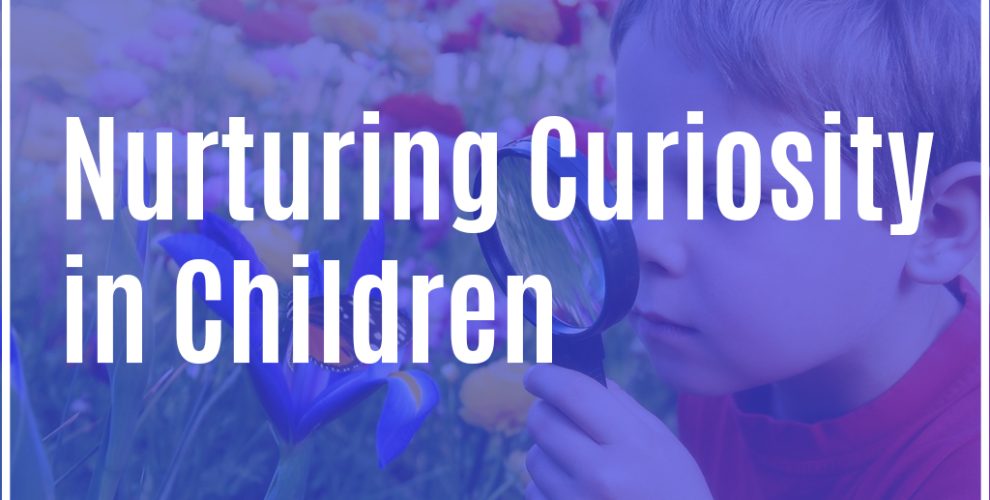Why is the grass green? How do birds fly? Where do babies come from? Why do the fishes live in water?
Children are born with a curious mind. They wonder at everything that they see and want to know why a certain thing is the way it is. This natural curiosity is what makes a child want to learn new things, every day, every hour, and every single minute. Children have a strong desire to learn and explore as curiosity is the root of the creativity, explorations, imagination, and development.
For us, as the teachers and parents, it is important that this innate desire to learn in children should be encouraged. The more curious the child is, the better learner he or she will be. In this article, we will see the various ways we can help nurture curiosity in children and support their growth.
Acknowledge their Questions:
Nurturing a child’s curiosity starts with acknowledging their questions. This does not mean that the question has to be answered immediately. Sometimes adults are caught unaware and are unable to provide age-appropriate answers. Explain to the child that you will find the answer and tell them. Never reprimand a child for asking questions no matter how vague the question may be as it will make the child feel that it is wrong to ask so many questions and hence may stop being curious about the things around them. This will also hamper their overall desire to learn.
Encourage their Interests:
Children learn so much through play and activities that capture their imagination. Encourage their hobbies and interests and incorporate them into their learning process. It is important to let children know that they can learn through play as well as through books.
Teach Observation:
Let the children learn to observe things around them; help them be keen observers. Create the interest in them to know more about their surroundings and the changes that occur around them. It is only when they are interested that they will learn to observe. Let them discover the world with their natural curiosity for things.
Encourage Reading:
Encourage the child to read. Reading opens up a whole new world of discoveries and explorations. It will develop their natural curiosity to find out more. Stories are like windows to the outside world for a child. Their curiosity will increase when they start to think of faraway lands and how much more they can learn.
Shun Monotony:
Children tend to immediately lose interest if they are given a monotonous routine to follow. They need a little variety to keep their interests alive. If boredom sets in, it will curb their curiosity. Let them explore new tasks and challenge their capabilities from time to time.
Let them Explore the Nature:
Help them to learn from the natural environment. Let them smell the flowers, touch the grass, and listen to the falling rain. This will stimulate their senses and nurture their curiosity.
Encourage Experiments:
Allow children to experiment with solutions to a given task. Forcing them to follow the set methods may diminish and eventually crush all the curiosity in them. Do not forget, it is someone’s encouraged curiosity only that we today have smartphones, planes, jets, electricity, and so many other things that we tend to take for granted. Never discourage a child’s creative spirit. Divergent thinking is a platform for lifelong learning.
Help them Learn from their Mistakes:
Allow your child to make mistakes as this will develop problem-solving skills in them. Let them do things independently and encourage them to find new ways to solve problems no matter how many mistakes they make. It is not important to constantly oversee the tasks that you have assigned to them. Let them explore various options to accomplish the task at hand.
How KRMS Help Nurture Curiosity and Creativity in Children?
We, at the K.R. Mangalam School, believe that it is the prerogative of not just the parents but the educators as well to nurture curiosity in children. Hence, we always strive to foster the innate ability in children to learn rather than forcing them to follow the rigid learning prototypes of the past. We motivate our students to learn by supporting and enhancing their natural desires to explore and gain knowledge.
Few simple steps that we regularly take to nurture the natural curiosity in our students, which will help them turn into life-long learners are:
- We add a fun element to learning by using different methods to reinforce the lessons such as games, projects, quizzes, role plays, discussions, visual aids, etc.
- We work on developing in students the critical thinking abilities, teamwork, problem-solving skills and creative thinking.
- We have created an environment where children are free to ask questions and give opinions.
- We allow the children time to think and resolve issues. We let them figure out the problems and find solutions on their own before extending a helping hand.
- We believe that nothing encourages a child’s learning endeavors more than recognizing their achievements with praise or rewards of any kind. We hence always make it a point to encourage our students by praising even the minutest achievements they make so that they feel motivated to do even better the next time.
- We facilitate learning through technology so that our students adapt well to all kinds of new technologies in the future.
At K. R. Mangalam, we take all efforts to nurture the natural curiosity in children, which we feel, is extremely necessary to enable them to grow into confident learners and leaders of the future. We believe it is the young age when the actual development of the children takes place . If they are molded correctly at this age, they can grow wonderfully. We, at K.R. Mangalam School, do exactly the same, that is, make the foundation of our students so strong so that they can efficiently grow up into successful personalities and forerunners of tomorrow.




Leave a Reply